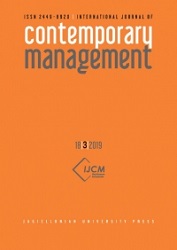Women in Management: Future Research Directions
Women in Management: Future Research Directions
Author(s): Marek Bugdol, Magdalena PokrzywaSubject(s): Gender Studies, Business Economy / Management, Human Resources in Economy, Socio-Economic Research
Published by: Wydawnictwo Uniwersytetu Jagiellońskiego
Keywords: women; management; organizations;
Summary/Abstract: Background. Gender is an important element regarding women’s (and men’s) situation in organizations. Numerous research studies indicate that women have the required competences and yet they hold positions, in particular top managerial positions, definitely less frequently than men. These differences can be explained by the still existing phenomenon of the glass ceiling and discrimination against women. In addition, knowledge about effective methods of preventing discrimination against women and their importance for the functioning of the organization is little. Research aims. The objective of this paper was to identify the dominant trends in research on women in organizational management. On the basis of the grouped results of the conducted literature review, the authors outlined new research directions which had previously been absent from, or attracted little attention in, the existing discourse. Methodology. The main method applied by the authors was systematic literature review and the principles of research conducted in the fields of management and business (Creswell, 2013; Easterby‑Smith, Thorne & Jackson, 2015). Key findings. The authors indicated various possibilities of conducting research on women in management. For example, studies on the glass ceiling effect do not explain differences between the conduct of organizations with a long‑term orientation and those pursuing short‑term objectives. As far as financial benefits are concerned, it is not clear what causes organizations whose management boards include women to achieve better financial results and how such results are influenced by the external context. With respect to preventing discrimination, an important task is to grasp the differences between the strength of prosocial behaviours and training/procedures. There are also many research directions that should be further developed, e.g. differences between women and men in the manifestation of counterproductive and citizenship behaviours.
Journal: International Journal of Contemporary Management
- Issue Year: 18/2019
- Issue No: 3
- Page Range: 53-80
- Page Count: 28
- Language: English

